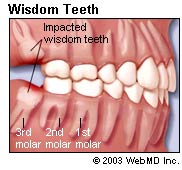In human terms, a wisdom tooth is any of those unusual third molars often coming in four. This includes both the mandibular and the maxillary third molars. These teeth generally have effects on other teeth while they develop such as becoming impacted.
Wisdom Tooth Pain
Picture 1 – Wisdom Teeth Picture

Wisdom teeth will certainly cause wisdom tooth pain which is one of the most dreaded conditions there is when having a wisdom tooth. This is one of the main reasons why they are extracted. The usual form of pain is impaction.
Wisdom Teeth Removal Procedure
The wisdom teeth removal procedure first consists of a dentist gaining access the tooth. If the wisdom tooth is beneath the gums and is totally encased inside the bone, the dentist will be required to make a gum tissue and remove a part of the bone that is over the tooth. And since each part is smaller than the whole tooth, it would be removed part by part through a smaller opening.
Wisdom Tooth Extraction
Wisdom teeth are extracted for a few reasons. One of these reasons for wisdom tooth extraction is when a wisdom tooth must fail to completely erupt through the bed of the gum and then the gum which is below the wisdom teeth would extend over the biting surface which would form a very soft tissue lid or flap around the wisdom tooth which is called operculum. An operculum covered tooth can be a very huge problem. The tooth would be really hard to clean with the use of a toothbrush and the person would have to use advanced cleaning techniques which includes the utilization of a plastic syringe without a needle to wash the tooth moderately with water or simply with hydrogen peroxide. Having an operculum is not a good thing. Food particles may be trapped inside the operculum which would later lead to bacteria and debris buildup causing more complications and pain.
Wisdom Teeth Removal Pain
After the removal, there would be wisdom teeth removal pain. Some problems cannot be avoided but there are some which can be prevented. The patient must not disregard any given instruction given by the dentist to prevent more pain. Some problems can even be life-threatening. Bleeding and oozing is one of the natural problems which would last up to three days.
Wisdom Teeth Removal Post Operative Care
After the surgery, wisdom teeth removal post operative care procedures must be done. This includes putting pressure on the teeth in order to stop the inevitable bleeding. Applying tannic acid is also helpful in order to form a clot which can be done by wrapping a tea bag in a piece of gauze. Elevation of the patients head when sleeping is also helpful to prevent swelling. Taking in steroids are helpful as well as placing ice at the tooth. A proper diet must be taken during recovery.
Wisdom Teeth Removal Recovery Time
After the surgery, the wisdom teeth removal recovery time is often two to three days.
Wisdom Teeth Removal Complications
Some of the wisdom teeth removal complications may include:
- Side effects of anaesthetics and other medications given during the surgery
- Swelling, discoloration, pain, bruising and discomfort at injection sites, face or jaws.
- Mouth-sinus hole which will result to sinusitis and then further lead to other infections.
- Nerve damage which leads to numbness of lip, chin, cheek, teeth and tongue.
- Lower jaw fracture due to excessive force to the lower jaw.
- Air Embolism.
- Brain abscess and even brain damage.
Wisdom Teeth Removal Care
During the surgery, the dental surgeon must take wisdom teeth removal care procedures in order to have a proper surgery and to prevent further complications. The surgeon must have a set of clean equipment. One of the mandatory care procedures is applying anesthetic in order to numb the teeth and the surrounding tissues so that the patient won’t feel pain. Nitrous oxide may also be applied.
References:
http://en.wikipedia.org/wiki/Wisdom_Tooth


